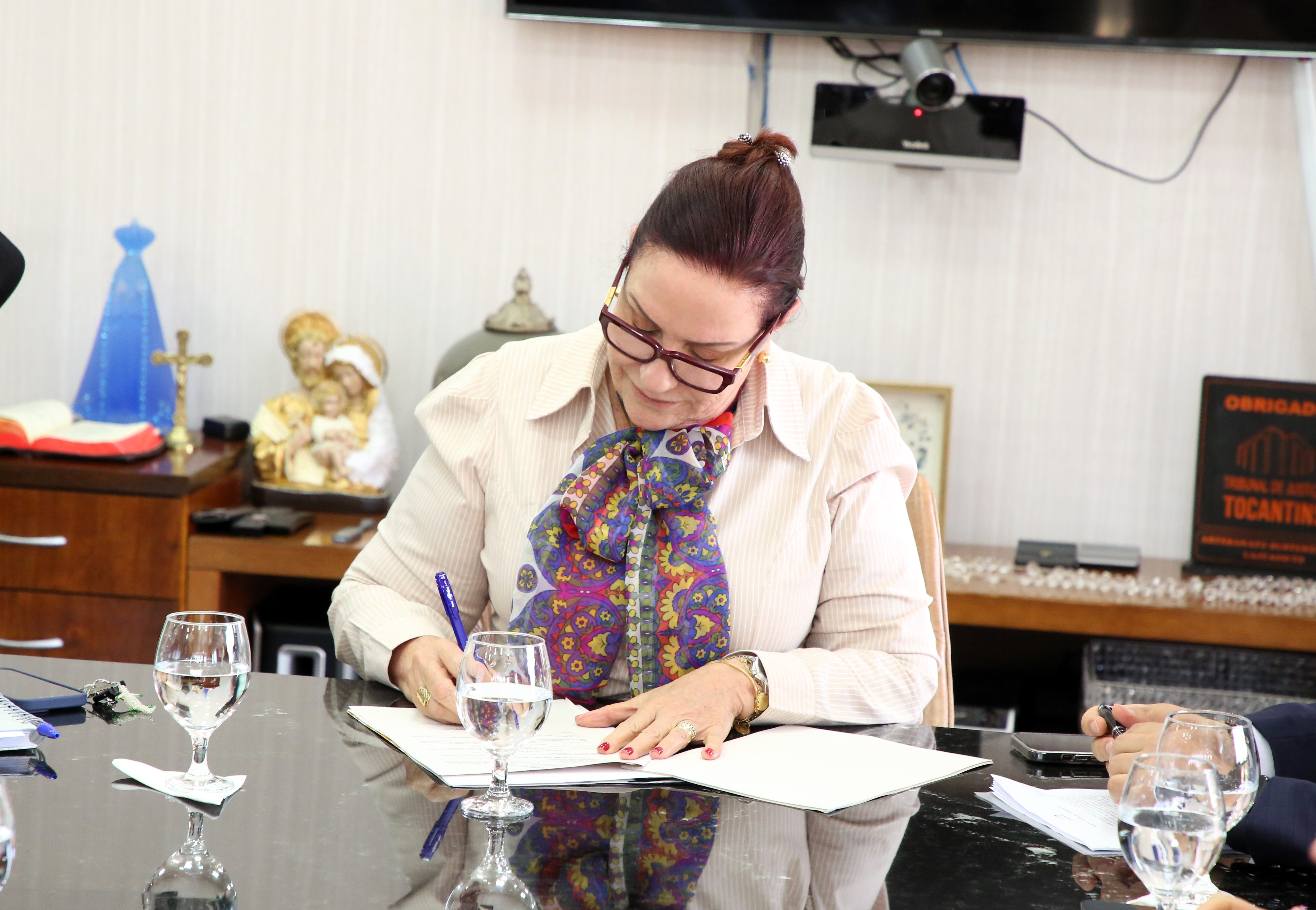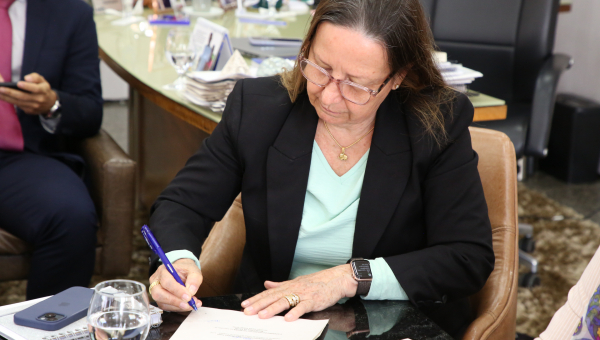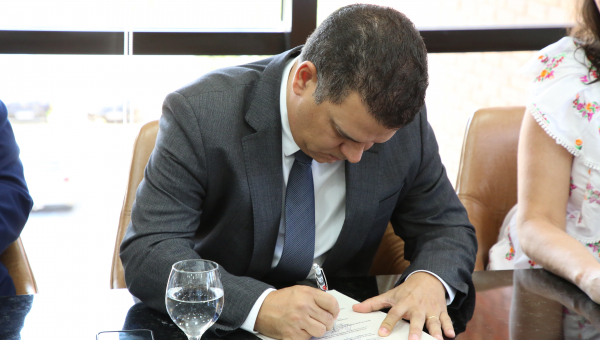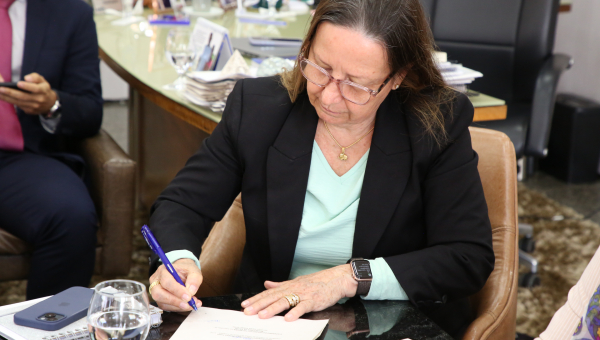
The Judiciary of the State of Tocantins has taken an important step towards guaranteeing fair, dignified and respectful treatment for all persons with mental disorders or psychosocial disabilities in the context of criminal proceedings and the enforcement of security measures. On Wednesday (August 28th), the Court of Justice (TJTO) signed, together with other institutions, the Cooperation Agreement for the Implementation and Monitoring of the Anti-Asylum Policy of the State, in accordance with the Resolution 487/2023 of the CNJ.
The proposal is to establish responsibilities and technical and operational conditions, through mutual cooperation among the entities. “Our goal is for each of the entities here to make a commitment to work towards the success of this policy,” said the President of the TJTO, Justice Etelvina Maria Sampaio Felipe, during the signing of the agreement.
At the time, the President said she was aware of the great demand there is, both in the judiciary and in other entities, such as health departments, and stressed that the Anti-Asylum Policy needs to be embraced by everyone, in order to ensure treatment and give dignity to these people who have historically been marginalized and subjected to inhumane treatment in closed institutions.
Integration
To this end, the signed agreement includes, among other measures, the integration of the procedures of the courts of knowledge and criminal execution with the actions of comprehensive psychosocial care, in accordance with the Law No. 10.216/2001, Decree No. 6.949/2009, Law No. 13.146/2015 and the Resolution No. 487/2023 of the CNJ, adopting the anti-asylum policy and prioritizing care in open environments, in the public health network.
It also establishes an integrated flow of procedures to be adopted, from the custody hearing, the execution and monitoring of security measures, to deinstitutionalization.
The State Inter-institutional Committee for Monitoring the Anti-Asylum Policy within the Judiciary of the State of Tocantins (Ceimpa/TO) is responsible for managing the Anti-Asylum Policy and will monitor it.
Obligations
The common obligations defined in the agreement include: fostering the proper implementation of the Anti-Asylum Policy of the Judiciary; issuing guidance, as of the signing of this Technical Cooperation Agreement, in order to promptly and adequately meet its purpose; providing technical and institutional support and the relevant information and documents for the monitoring and deinstitutionalization of people with mental disorders or psychosocial disabilities in conflict with the law, while observing the guarantees provided for in the General Personal Data Protection Law and taking care with sensitive data and personal health information.
In addition, to act in partnership in the planning, implementation, execution, monitoring and evaluation of the Anti-Asylum Policy, and the processes of partial and total interdiction of psychiatric custody and treatment establishments, as well as acting for their qualification, to the extent of their attributions.
And to jointly hold lectures, courses and seminars, and to create and implement a Permanent Education Plan on Criminal and Judicial Policies, Mental Health and Social Assistance for guidance on the Anti-Asylum Policy of the Judiciary, aimed mainly at professionals from the Justice, Health and Social Assistance Systems.
The agreement establishes obligations for each institution that, together with the TJTO, is committed to the Anti-Asylum Policy: the State Government, through the secretariats of Health, Labor and Social Development, Citizenship and Justice and Public Security; the Military Police; the Group for Monitoring and Inspection of the Prison and Socio-Educational Systems of the State of Tocantins; the State Public Defender's Office; the State Prosecution of Tocantins; the Council of Municipal Health Secretariats of the State and the State Collegiate of Municipal Social Assistance Managers.
Purpose
The Anti-asylum Policy aims to: establish and monitor procedures for the treatment of the persons with mental disorders or any form of psychosocial disability who are in custody; implement actions to deinstitutionalize these people; and promote the articulation of programs and services of the Unified Health System (SUS), the Unified Social Assistance System (SUAS) and human rights, and of these with the Justice System to implement actions.
It also seeks to carry out permanent education processes for professionals from the Health, Social Assistance, Justice, Prison Administration and Public Security Systems; propose the formulation and changes needed to redirect the model of care for the persons with mental disorders or any form of psychosocial disability in conflict with the law in the State of Tocantins; and support and carry out local, regional and national diagnoses, studies and research into the treatment and measures applicable to people with mental disorders or any form of psychosocial disability who are in custody.
In addition to foster the implementation of multi-professional teams that work on cases involving people with mental disorders or psychosocial disabilities, as well as carrying out and receiving bio psychosocial assessments in these cases, carrying out institutional visits and monitoring inspections, and subsidizing and fostering the review of processes that consider the Singular Therapeutic Project (PTS) and the monitoring and discussion of cases.
Ceimpa/TO
The management, follow-up and monitoring of the Anti-Asylum Policy within the scope of the Judiciary and the inter-institutional flows of deinstitutionalization and comprehensive psychosocial care for people with mental disorders or psychosocial disabilities in conflict with the law will be the responsibility of the State Inter-Institutional Committee for Monitoring the Anti-Asylum Policy (Ceimpa).
The committee is made up of the following entities: the Group for Monitoring and Supervision of the Prison System and the System of Socio-Educational Measures; the General Internal affairs of Justice; the Criminal Court of the city of Palmas; the State Prosecution; the Public Defender's Office; the State Department of Health; the State Department of Labor and Social Development; the State Department of Citizenship and Justice; the State Department of Public Security; and the State Military Police of Tocantins.
Expressions of support
Present at the signing of the Agreement were Justices Maysa Vendramini Rosal (Chief Justice of the State of Tocantins) and Pedro Nelson de Miranda Coutinho (Supervisor of the Group for the Monitoring and Inspection of the Prison System and the System for the Execution of Socio-Educational Measures of the Judiciary of the State of Tocantins); Judges Allan Martins Ferreira (coordinator of the Interinstitutional Committee for Monitoring the Anti-Asylum Policy of the State of Tocantins) and Jordan Jardim (coordinator of the Prison System Monitoring and Inspection Group); the General Attorney, Luciano Casaroti; the Public Defender Estellamaris Postal; the Secretary of Public Security, Wlademir Costa Mota Oliveira; the Executive Secretary of Citizenship and Justice, Hélio Pereira Marques; and representatives of the Military Police, the Health Department and the health and social assistance councils, on the occasion, paid their respects to Justice Etelvina Maria Sampaio and the Judiciary, due to the Máximus Operation, authorized by the Superior Court of Justice (STJ) and carried out last Friday (August 23rd).
In their expressions of support, everyone reaffirmed their confidence in the Judiciary of the State of Tocantins and its members. The members of the justice system also emphasized the seriousness and exemplary performance of the President of the TJTO, both at the head of management and as a Judge during her 35 years as a magistrate. “May the truth come out and may the Judiciary continue to act to do justice,” said one of those present.












